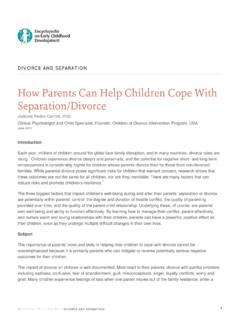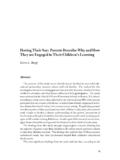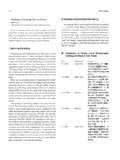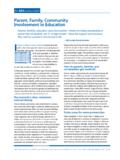Transcription of Parent involvement in education: models, strategies and ...
1 Parent involvement in education : models, strategies and contexts Shawn Moore, Sue Lasky In this paper, we explore the conceptual, culture between home and school, and empirical and strategic literature related to Parent institutional barriers are bound to arise. Involving involvement in educatio n. Parent involvement in parents as partners requires an understanding of schooling has traditionally taken many forms parents' perceptions of schoo ling, their including parents helping their children with aspirations for their children, their approach to homework, Parent -teacher interviews, Parent parenting, their expectations of teachers, an d their nights, special consultation on student problems, concept of their role and respons ibilities.
2 Parent councils, and Parent volunteer help in the We first examine child- Parent interactions both school and the classroom. Some evidence inside and outside the home through the suggests that activities of this nature can have theoretical lens of stages in a child's cognitive, beneficial effects on student learning. From a emotional and social development, explore the socio-cultural perspective, however, we will barriers that divide teachers and parents, paren ts review other evidence indicating that traditional and schools, and parents and their children, relationships between teachers and parents can identify the socio-cultural factors that influence also perpetuate a power imbalance in favour of school- Parent understanding, and propose teachers.
3 In recent years, teachers' relationships strategic approaches that can enhance with parents have become more uncertain and communication, community and partnerships contentious. Parents are becom ing more between parents, teachers and schools. In our questioning and critical about issues of consideration of the empirical literature, we paid curriculum, the quality of instruction and special attention to exemplary stud ies and models practices used to assess and evalu ate their which have received auth oritative recognition in children. Home-school relationships are changing the field and cutting edge research that provides for a multitude of reasons including greater new insights into Parent -teacher interaction.
4 We diversity of the Parent population , changes in argue that the structures of schooling must sh ift family structures, increasing school ch oice, more from closed and protectionist to open and parental involvement in the governance of inclusionary if Parent -teacher partnerships are to schools, new methods of assessment and flourish over time and benefit children. reporting, and special education legislation. Second, we consider the implications of the These developments have implications for Parent conceptual and empirical literature for the involvement and stud ent achievement.
5 Organization and substance of the EQAO. Formulating new strategies for inv olving parents ( education Quality and Accountability Office). in their children's learning is particularly grade 3 and grade 6 Home Questionnaires. important during this time of profound social Surveys are important, commonly used tools for change and educational reform in Ontario, gathering information abou t how parents are nationally and internationally. Since parents are involved in their children's learning and the kind not a homogeneous group, conflicts concerning of modelling they provide in the learning process.
6 Expectations between parents and teachers, The validity and reliability of such instru ments is 14 Building bridges between home and school important if the data are to be trusted for making significant ways. Our review ex plores where claims, predictions, and policy decisions. The Parent involvement is conceptually and Home Questionnaire operates concurrently in a structurally positioned within the educational wider context of demographic and educational change process. In this regard, the experiences of change. Socio-cultural meanings embedded in the educators and parents in other jurisdictions can be questions may resonate with some parents, but highly relevant in the Ontario context .
7 The confound others. We analyzed the Home changes occurring in pu blic schooling in Ontario Questionnaires in relation to literature on Parent today are, in part, the result of pressures from involvement and what is known to date about parents themselves. We need to keep this in mind best practice. We argue that the Home as we explore the concepts, m odels and contexts Questionnaire needs to reflect the socio-cultural of Parent involvement in ed ucation. experiences of parents as a diverse group and that the ability to disaggregate these Parent data Objectives according to key demographic variables can - conduct a critical review of the conceptual and deepen our understanding of the dynamics of methodological literature in order to assess parents' involvement (or lack thereof) in the Parent involvement and its relation to school home and in the sch ool.
8 Achievement, including the role of family and Finally, our review takes place in a climate of school demography. tumultuous change on the educational landscape - evaluate empirical findings concerning the in Ontario as well as concurrent sweeping relationship between different forms of Parent educational changes in other Canadian provinces involvement and student motivation, learning and countries. These changes reflect paradoxical and success. forces of centralization and decentralization. In - elucidate how patterns of Parent inv olvement in Ontario, for example, the ministry has centralized education vary according to differences in educational taxing and sch ool funding while social class, language, traditions, ethnocultural decentralizing power to school councils.
9 It has background, and family type ( , single centralized and standardized curriculum and Parent , blended family). reporting while decentralizing responsibilities for - engage critically with the EQAO grade 3 and implementing these new policies. The reform grade 6 Parent surveys bas ed on the literature. scenario has provoked spirited debate in the - conceptualize alternative models of Parent province on the future of public education involvement in education from a synthesis of including the role of parents in schooling. Some theoretical frameworks, empirical findings, and claim that current educational chang es in Ontario practical considerations.
10 Are progressive' in response to changing - identify strategic implications of empirical community demographics, the need for greater findings for enhancing communications accountability to parents, and the requirements of between parents and teachers and promoting a competitive global economy. Other observers, Parent involvement in their children 's learning. however, are critical of current reforms as narrow in scope, regressive in terms of teaching and Design and methodology learning, and insensitive to the day-to-day We began with a global search of the literature on realities of teachers' professional lives.







